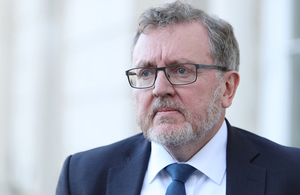News story: Let’s get digital – new online system to cut Blue Badge application time
New service means applicants can complete the entire process online.
New service means applicants can complete the entire process online.
If you are applying for a trade mark, it may take longer than normal to receive your notification email.

David Mundell, Secretary of State for Scotland
Speaking the day before [Monday 14 January 2019] the vote in the House of Commons, Mr Mundell said:
The Prime Minister’s deal is a product of tough negotiation.
It will mean an orderly Brexit which takes us out of the Common Fisheries Policy, guarantees EU citizens’ rights, ensures the vital transition period that businesses need, and lays the foundations for negotiating our long-term future trading relationship with the EU.
It brings certainty, and that’s what the people I speak to want. It is what business leaders across Scotland have been calling for. It also avoids the kind of chaos and confusion nationalists crave because they believe it would strengthen their demand for a second independence referendum.
I do not claim it is perfect – but it does achieve key objectives.
If we do not back this deal, in just 74 days’ time the UK risks crashing out of the EU without a deal. Or we could be drifting towards a situation where we fail to respect the referendum result to deliver Brexit. Those are the real alternatives to leaving with the Prime Minister’s deal.
Tomorrow’s vote is not about a lengthy wishlist of fanciful Brexit options. The real alternatives – no deal or no Brexit – are clear. I hope colleagues will reflect on that and support the Prime Minister’s deal.
Published 14 January 2019
Government has launched an ambitious new strategy to clean up our air and save lives
Launched by the government’s Exporting is GREAT campaign, the 6 part series will showcase the stories of some of the country’s leading entrepreneurs and businesses.